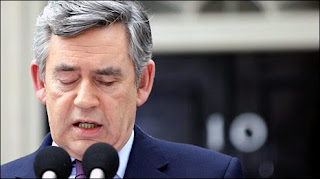Mr Brown, prime minister since 2007, said he hoped a successor as Labour leader would be in place by September.
The Lib Dems have been negotiating for days with the Tories - who won the most seats and votes in the UK election.
But the Lib Dems have asked for formal talks with Labour. Mr Brown said it was in the "national interest" to respond.
Mr Brown's statement will be seen as a move to smooth the way to a deal between Labour and the Liberal Democrats to form a government.
BBC political editor Nick Robinson said it was an audacious bid by Mr Brown to keep Labour in power - and himself in power for a limited period - and Tory MPs would be furious.
Voters' judgement
It comes after further talks between the Tory and Lib Dem negotiating teams and another meeting between Tory leader David Cameron and Lib Dem leader Nick Clegg.
Mr Clegg's team then talked through options with Lib Dem MPs, who urged them to continue to listen to Labour, while seeking further clarification from the Tories about key areas of policy.
Meanwhile Mr Cameron is meeting Conservative MPs and the Cabinet is meeting in Downing Street.
The Conservative leader made no comment as he arrived at a committee room in the House of Commons to address his MPs, to loud applause.
In his statement, Mr Brown said Britain had a "parliamentary and not presidential system" and said there was a "progressive majority" of voters.
Leadership process
He said if the national interest could be best served by a coalition between the Lib Dems and Labour he would "discharge that duty to form that government".
But he added that no party had won an overall majority in the UK general election and, as Labour leader, he had to accept that as a judgement on him.
"I therefore intend to ask the Labour Party to set in train the processes needed for its own leadership election.
"I would hope that it would be completed in time for the new leader to be in post by the time of the Labour Party conference.
"I will play no part in that contest, I will back no individual candidate."
Lib Dem leader Mr Clegg had requested formal negotiations with Labour and it was "sensible and in the national interest" to respond positively to the request, Mr Brown said.
He said a "formal policy negotiation process" would be established.
It emerged earlier that the Lib Dem negotiating team, who have held days of talks with the Conservatives, had also met senior Labour figures in private.
But it was understood that one of the stumbling blocks to any Labour-Lib Dem deal was Mr Brown himself.
Mr Clegg said he was "very grateful to David Cameron and his negotiation team" and they had had "very constructive talks" and made a "great deal of progress".
But he said they had not "reached a comprehensive partnership agreement" and it was the "responsible thing to do" to open negotiations with the Labour Party on the same basis, while continuing talks with the Tories.
BBC political correspondent Iain Watson said he understood some Cabinet members were sceptical about the idea of a "progressive alliance" with the Lib Dems and were concerned it would look bad.
'Right thing'
And he said Mr Brown would be asking Cabinet ministers not to launch immediate leadership campaigns, for fear it would look undignified.
John Mann, the first Labour MP to call for him to go after the election result, said Mr Brown had made a "wise and brave" decision.
Cabinet minister Douglas Alexander told Sky News Mr Brown had decided to step down last week but was "very keen to ensure that he meets his constitutional obligations which is to ensure that a government is formed".
And the SNP's Westminster leader Angus Robertson said it was "inevitable" Mr Brown would have to go and he had "done the right thing". He said he believed a "progressive alliance" involving Labour, the Lib Dems and the SNP which would "deliver the best result for the people of Scotland".
But Conservative MP Nigel Evans told the BBC: "The fact he's going in September, I think the country passed its verdict. Gordon, they want you to go now."
And fellow Conservative Richard Ottaway said the "numbers don't add up" for Labour and the Liberal Democrats to form a coalition.
"A Labour-Liberal Democrat coalition is only a handful more than the Conservative Party on its own and it would not be able to hold the line on this for very long," he told BBC Radio 4's PM programme.
The Tories secured 306 of the 649 constituencies contested on 6 May. It leaves the party short of the 326 MPs needed for an outright majority, with the Thirsk and Malton seat - where the election was postponed after the death of a candidate - still to vote.
Labour finished with 258 MPs, down 91, the Lib Dems 57, down five, and other parties 28.
If Labour and the Lib Dems joined forces, they would still not have an overall majority.
With the support of the Northern Irish SDLP, one Alliance MP, and nationalists from Scotland and Wales they would reach 328, rising to 338 if the DUP, the independent unionist and the new Green MP joined them.
BBC News










0 comments:
Post a Comment